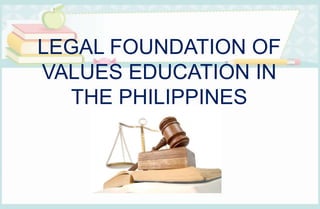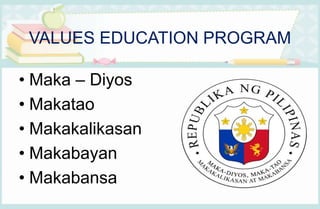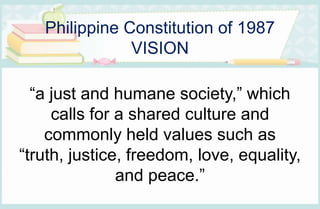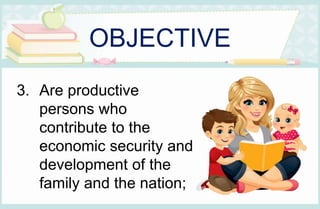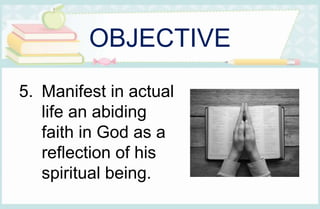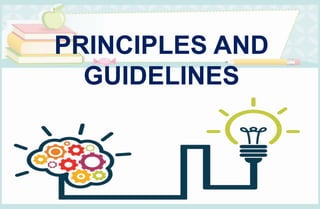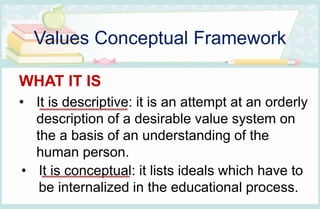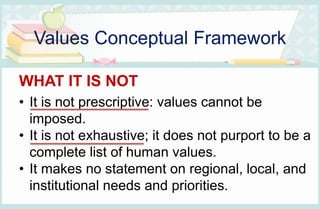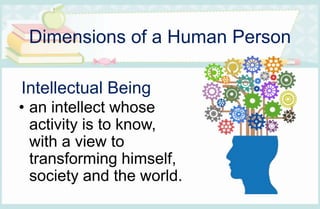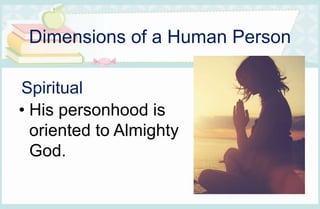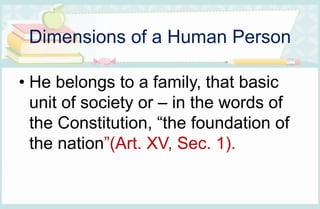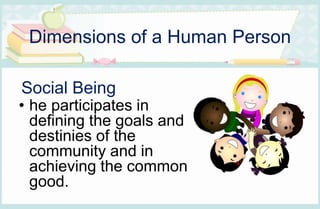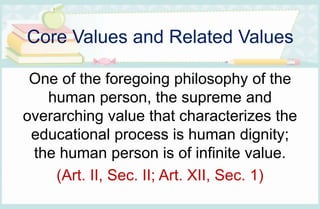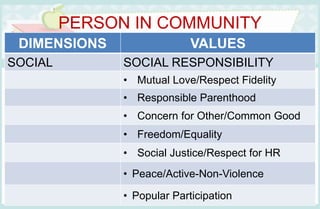Foundation of Values Education
- 1. Foundation of Values Education Manuel V. Gallego Foundation Colleges, Inc. By: Haidilyn T. Angeles, BEEd – IV
- 2. LEGAL FOUNDATION OF VALUES EDUCATION IN THE PHILIPPINES
- 3. LEGAL FOUNDATION Department Order (DO) No. 41 Series of 2003
- 4. VALUES EDUCATION PROGRAM • Maka – Diyos • Makatao • Makakalikasan • Makabayan • Makabansa
- 5. VALUES EDUCATION SOCIAL FUNCTION unite the families, tribes, societies, and nations
- 6. K – 12 Programme Character Education Edukasyong Pagpapakatao • honing an individual’s capacity to make moral and ethical decisions and actions.
- 7. VALUES EDUCATION includes five macro-skills: • Understanding • Reflecting • Consulting • Decision – Making • Performing
- 9. Philippine Constitution of 1987 VISION “a just and humane society,” which calls for a shared culture and commonly held values such as “truth, justice, freedom, love, equality, and peace.”
- 11. GOAL “To provide and promote values education at all levels of the educational system for the development of the human person committed to the building of a just and humane society and an independent and democratic nation.”
- 13. OBJECTIVE Proper implementation of the program will develop Filipinos who: 1.Are self- actualized, integrally developed human beings imbued with a sense of human dignity;
- 14. OBJECTIVE 2. Are social beings with a sense of responsibility for their community and environment;
- 15. OBJECTIVE 3. Are productive persons who contribute to the economic security and development of the family and the nation;
- 16. OBJECTIVE 4. As citizens, have a deep sense of nationalism, and committed to the progress of the nation as well as of the entre world community through global solidarity; and
- 17. OBJECTIVE 5. Manifest in actual life an abiding faith in God as a reflection of his spiritual being.
- 19. Principles and Guidelines 1. It must be oriented toward the total person of the learner – mind, heart, and entire being. 2. It must take into consideration the unique role of the family in one’s personal development and integration into society and nation.
- 20. Principles and Guidelines 3. In the school context, more important than lesson plan and any list of values are the teachers themselves who have the proper sense of values, awareness of their inner worth, and outmost respect for the person of the other.
- 22. • It is conceptual: it lists ideals which have to be internalized in the educational process. Values Conceptual Framework WHAT IT IS • It is descriptive: it is an attempt at an orderly description of a desirable value system on the a basis of an understanding of the human person.
- 23. Values Conceptual Framework WHAT IT IS • It is intended to be applicable in varying degrees to all three levels of the educational system. • It is broad and flexible enough for adaptation to specific contexts.
- 24. Values Conceptual Framework WHAT IT IS NOT • It is not prescriptive: values cannot be imposed. • It is not exhaustive; it does not purport to be a complete list of human values. • It makes no statement on regional, local, and institutional needs and priorities.
- 25. Values Conceptual Framework WHAT IT USES • It is desirable that regions, localities, and institutions construct their own values map, with clearly defined priorities, suited to their peculiar context and needs.
- 26. PHILOSOPHY
- 27. PHILOSOPHY OF THE PROGRAM The values education program is based on the philosophy of the Human Person.
- 28. PHILOSOPHY OF THE PROGRAM The human person is the subject of education: he is a human person learning and being taught.
- 29. PHILOSOPHY OF THE PROGRAM The human person is also the object: the human person is at the centre of the curriculum and the entire program. It is for the attainment of “Just and Humane Society.”
- 30. DIMENSIONS OF A HUMAN PERSON
- 31. Dimensions of a Human Person Intellectual HUMAN PERSON Moral Spiritual Social Economic Physical Political AS SELF AS MEMBER OF THE COMMUNITY
- 32. Dimensions of a Human Person 1. The person is an individual self conscious being of incalculable value in himself (Art. I, Sec II; Art XII, Sec. I) who cannot be a mere instrument of the society and of the state.
- 33. Dimensions of a Human Person • He is not just body and soul juxtaposed or mixed as oil or water; but he is an embodied spirit. Hence, his physical, intellectual, moral and spiritual well-being is recognized by the State (Art. II, Sec 13).
- 34. Physical Being • He has material needs Dimensions of a Human Person
- 35. Intellectual Being • an intellect whose activity is to know, with a view to transforming himself, society and the world. Dimensions of a Human Person
- 36. Moral Being • he is endowed with a free will which searches for the good and whose motive force is love. Dimensions of a Human Person
- 37. Spiritual • His personhood is oriented to Almighty God. Dimensions of a Human Person
- 38. Dimensions of a Human Person 2. The human person, however, does not live in isolation but in community with other persons – physical, intellectual, moral and spiritual like himself. Hence, he is inevitably (Art. II, Sec. 13).
- 39. Dimensions of a Human Person • He belongs to a family, that basic unit of society or – in the words of the Constitution, “the foundation of the nation”(Art. XV, Sec. 1).
- 40. Social Being • he participates in defining the goals and destinies of the community and in achieving the common good. Dimensions of a Human Person
- 41. Political Being • as pursuing the goal of “social progress” and “total human liberation and development.” (Art. II, Sec. 17) Dimensions of a Human Person
- 43. Core Values and Related Values One of the foregoing philosophy of the human person, the supreme and overarching value that characterizes the educational process is human dignity; the human person is of infinite value. (Art. II, Sec. II; Art. XII, Sec. 1)
- 45. HUMAN AS SELF DIMENSIONS VALUES PHYSICAL HEALTH • Physical Fitness • Cleanliness • Harmony w/ the material • Universe • Beauty • Art
- 46. HUMAN AS SELF DIMENSIONS VALUES INTELLECTUAL TRUTH • Knowledge • Creative and critical Thinking MORAL LOVE • Integrity/Honesty • Self-Worth/Self-Esteem • Personal Discipline
- 47. PERSON IN COMMUNITY DIMENSIONS VALUES SOCIAL SOCIAL RESPONSIBILITY • Mutual Love/Respect Fidelity • Responsible Parenthood • Concern for Other/Common Good • Freedom/Equality • Social Justice/Respect for HR • Peace/Active-Non-Violence • Popular Participation
- 48. HUMAN DIGNITY DIMENSIONS VALUES POLITICAL NATIONALISM • Common Identity • National Unity, Esteem for Nat’l Heroes • Commitment/Civic Consciousness /Pride, • Bayanihan/Solidarity/Loyalty to Country
- 49. HUMAN DIGNITY DIMENSIONS VALUES POLITICAL GLOBAL SOLIDARITY • International understanding and cooperation
- 52. • Values Education for the Filipino, http://www.valueseducation.net/vep.htm • https://www.slideshare.net/bugsydejulio/deped- values-education-program?from_action=save • https://www.slideshare.net/hayasharm/chapter2- ni • http://www.deped.gov.ph/wp- content/uploads/2019/01/ESP-CG.pdf


